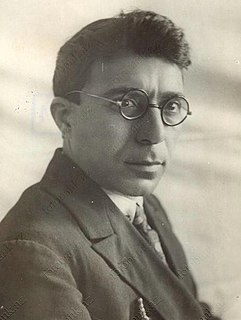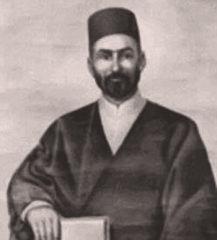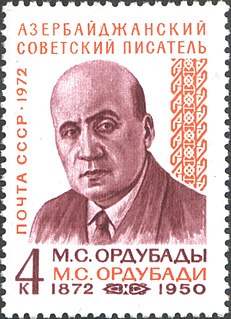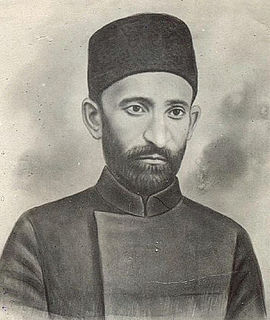 W
WMammad Araz, born Mammad Ibrahimov, was an Azerbaijani poet. Araz, his pen name, identifies the river that became the border separating present-day Azerbaijan and Iran when Azerbaijan was divided more than 180 years ago.
 W
WBabi Badalov is an Azerbaijani visual artist and poet.
 W
WPirouz Dilanchi is an Iranian-Azerbaijani separatist leader.
 W
WMahammad bin Suleyman, better known by his pen name Fuzuli, was an Azerbaijani, of the Bayat tribes of Oghuz, poet, writer and thinker. Often considered one of the greatest contributors to the divan tradition of Azerbaijani literature, Fuzuli in fact wrote his collected poems (divan) in three different languages: in his native Azerbaijani, Arabic and Persian. He was well-versed in both the Ottoman and Chagatai Turkic literary traditions as well as mathematics and astronomy.
 W
WMahammad Hadi or Agha-Mahammad Haji-Abdulsalim oglu Abdulsalimzade was an Azerbaijani romanticist poet.
 W
WIzzeddin Hasanoğlu was the founder of literature in Azerbaijani language.
 W
WIsmail I, also known as Shah Ismail I, was the founder of the Safavid dynasty, ruling from 1501 to 23 May 1524 as Shah of Iran (Persia).
 W
WJafar Gafar oglu Jabbarli, was an Azerbaijani playwright, poet, director and screenwriter.
 W
WAhmad Javad was an Azerbaijani poet. Javad is most remembered for writing the words of the National Anthem of Azerbaijan, which was used during the Democratic Republic of Azerbaijan between 1918–1920, and which has been reinstated now that Azerbaijan has regained its freedom, since 1991, and another poem named Çırpınırdı Qaradəniz.
 W
WHuseyn Javid ,was born Huseyn Abdulla oglu Rasizadeh, was a prominent Azerbaijani poet and playwright of the early 20th century. He was one of the founders of progressive romanticism movement in the contemporary Azerbaijani literature. He was exiled during the Stalin purges in the USSR.
 W
WQāżi Aḥmad Borhān al-Din was an Oghuz Turkic vizier to the Eretnid rulers of Anatolia. In 1381 he took over Eretnid lands and claimed the title of sultan for himself. He is most often referred to by the title Qadi, a name for Islamic judges, which was his first occupation.
 W
WSevda Mikayilova is an Azerbaijani philologist and poet.
 W
WAli Mojuz or Mirza Ali Mojuz Shabestarti was an Iranian Azerbaijani poet. He chose to write in Azeri Turkish instead of Persian, Iran's dominant language.
 W
WSeyid Abulgasim Nabati was a 19th-century Iranian Azerbaijani poet.
 W
WQasham Najafzadeh is an Azerbaijani poet.
 W
WAlī Imādud-Dīn Nasīmī, often known as Nesimi, was a 14th-century Azerbaijani or Turkmen Ḥurūfī poet. Known mostly by his pen name of Nesîmî, he composed one divan in Azerbaijani, one in Persian, and a number of poems in Arabic. He is considered one of the greatest Turkic mystical poets of the late 14th and early 15th centuries and one of the most prominent early divan masters in Turkic literary history.
 W
WAli Nazem – was an Azerbaijani poet, writer and literary critic of Azerbaijani literature.
 W
WMammad Said Ordubadi was Azerbaijani writer, poet, playwright and journalist.
 W
WBulud Qarachorlu, mainly known by his pen name,, was a legendary Iranian poet of the Azerbaijani people. Sahand wrote in the Azerbaijani language.
 W
WKhasta Qasim – was an Iranian Azerbaijani poet of Azerbaijani literature. Khasta Qasim was one of the best Azerbaijani-language poets; he was also a mystic, ashik, and philosopher in the era of the Afsharid dynasty, popularly known as Dada and Gasim.
 W
WQovsi Tabrizi was an Iranian poet of the 17th century.
 W
WSuleyman Rustam, is poet of the Soviet Azerbaijan, playwright and a public figure. He is the poet of the Azerbaijan SSR (1960), laureate of the Stalin State Prize of the second degree (1950), Hero of Socialist Labour (1976) and a member of the Communist Party of the Soviet Union from 1940.
 W
WMirza Alakbar Sabir, born Alakbar Zeynalabdin oglu Tahirzadeh was an Azerbaijani satirical poet, public figure, philosopher and teacher. He set up a new attitude to classical traditions, rejecting well-trodden ways in poetry.
 W
WAbbas Sahhat, born Abbasgulu Aliabbas oglu Mehdizadeh, was an Azerbaijani poet and dramatist.
 W
WSeyid Yahya Bakuvi – was an Azerbaijani scientist and philosopher of medieval ages.
 W
WSeyyed Mohammad Hossein Behjat Tabrizi, mainly known by his pen name, Shahriar, was a notable Iranian Azerbaijani poet who wrote in both Azerbaijani and Persian. His most important work, Heydar Babaya Salam is considered to be the pinnacle in Azerbaijani literature which gained great popularity in the Turkic world and was translated to more than 30 languages.
 W
WSeyid Azim Shirvani was an Azerbaijani poet and enlightener. He got his first religious education in Iraq. After returning to motherland he refused his spiritual dignity and opened a private school. Seyid Azim Shirvani continued Fuzûlî’s traditions in his love-lyrical poems. In his satirical poems and fables Seyid Azim Shirvani ridiculed priesthood, opposed backwardness and ignorance, called to enlightenment and culture. Contemporary poets consider him their teacher.
 W
WTahmasp I was an influential Shah of Iran, who enjoyed the longest reign of any member of the Safavid dynasty. He was the son and successor of Ismail I.
Molla Vali Vidadi was an Azerbaijani poet.
 W
WSamad Vurgun (Azerbaijani: Səməd Vurğun, [sæˈmæd vurˈɣun], born Samad Yusif oglu Vakilov was an Azerbaijani and Soviet poet, dramatist, public figure, first People's Artist of the Azerbaijan SSR, academician of Azerbaijan National Academy of Sciences, laureate of two USSR State Prizes of second degree, and member of the Communist Party of the Soviet Union since 1940.
 W
WYaqub b. Uzun Hasan commonly known as Sultan Ya'qub was the ruler of Aq Qoyunlu dynasty from 1478 until his death in December 14, 1490. A son of Uzun Hasan, he became the ruler of the dynasty after the death of Sultan Khalil. The borders of Aq Qoyunlu dynasty remained stable during his reign. In his book Alam-Aray-i Amini, Fazl b. Ruzbihan Khunji praised him as a decent successor of Uzun Hasan. Other historians also praised Ya'qub for his patronage of scientists and poets.